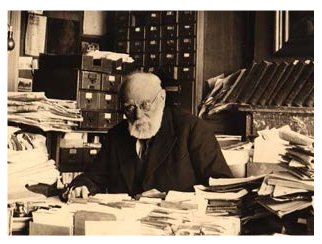The idea of the internet was born in Belgium
IDEA No 1
THE MUNDANEUM
In 1934, six decades before the birth of the Web, a Belgian bibliophile described his vision for a télé photographie, an electronic telescope which could transmit any document in the world to a television screen.

Paul Otlet, founder of the Mundaneum and creator of the Universal Decimal Classification system.
Paul Otlet loved libraries. In 1891 he met a kindred spirit, fellow Belgian and future Nobel Prize winner, Henri La Fontaine. Together they conceived the Mundaneum, a comprehensive collection of the world’s published knowledge, equal in ambition to the great Library of Alexandria.
By 1910, they had collected thousands of books, newspapers, photographs, journals, posters and postcards. Otlet called the collection the Réseau, a network of documents connected by ‘links’ detailed on index cards. More than blind signposts, these links indicated the relationships between documents, an implementation of what we now call the Semantic Web. As the Mundaneum grew, this degree of annotation became unmanageable. Otlet put his mind to new technologies that would overcome the limitations of paper-based records. In his 1935 book Monde, he describes ‘a machinery unaffected by distance which would combine at the same time radio, X-rays, cinema and microscopic photography.... From afar anyone would be able to read any passage that would be projected onto his individual screen, thus in his armchair, anyone would be able to contemplate the whole of creation or particular parts of it.’
Otlet described the Web six decades ahead of its invention, even predicting social networks with remarkable accuracy, expecting users to ‘participate, applaud, give ovations and sing in the chorus’. A true visionary, Otlet also foresaw the mobile revolution, writing in 1906, ‘Tomorrow, telephony will be wireless ... Everyone will carry, in his or her pocket, a tiny little handset that will be tuned with the turn of a screw to the wavelength adopted by each emitting centre.’
Otlet died in 1944 with his life’s work in ruins, destroyed to make way for an exhibition of Third Reich art. Following the war, he was almost forgotten as American pioneers such as Vannevar Bush, Douglas Engelbart and Theodor (Ted) Nelson came to the foreground. It was not until W. Boyd Rayward published Otlet’s biography in 1975 that the remarkable prescience of his work became apparent.
The Mundaneum museum opened in Mons, Belgium, in 1998, and in 2012, Google offered its support, recognizing Paul Otlet and Henri La Fontaine as its spiritual forefathers. Vinton Cerf, inventor of the internet, says it as it is: ‘The idea of the internet was born in Belgium.’■
‘A true visionary, Otlet also foresaw the mobile revolution.’

Volunteers at the Mundaneum classified around 17 million publications. Their work has become known as the Index Card Internet.
